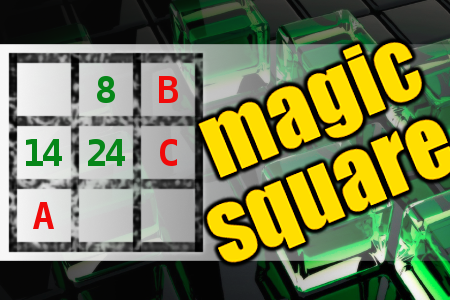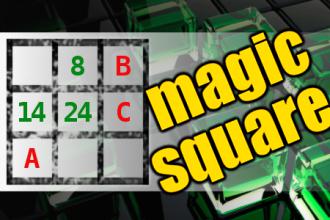MAGIC SQUARE: Calculate A-B*C
The aim is to place the some numbers from the list (7, 8, 14, 24, 25, 31, 57, 58, 64) into the empty squares and squares marked with A, B an C. Sum of each row and column should be equal. All the numbers of the magic square must be different. Find values for A, B, and C. Solution is A-B*C.
Hot Water
John works hard and spends two nights each week bowling and plays golf every Saturday.
His wife thinks he's pushing himself too hard, so for his birthday she blindfold him and takes him to a local strip club.
The doorman at the club greets them and says, "Hey, John! How ya doin?"
Once inside his wife removes the blindfold but she's puzzled and asks if he's been to this club before.
"Oh no," says John. "He's on my bowling team."
When they are seated, a waitress asks John if he'd like his usual and brings over a Budweiser.
His wife is becoming increasingly uncomfortable and says, "How did she know that you drink Budweiser?"
"I recognize her, she's the waitress from the golf club. I always have a Bud at the end of the first nine, honey.
A stripper then comes over to their table, throws her arms around John, starts to rub herself all over him and says, "Hi Johnny. Want your usual table dance, big boy?"
John's wife, now furious, grabs her purse and storms out of the club. John follows and spots her getting into a cab. Before she can slam the door, he jumps in beside her.
John tries desperately to explain how the stripper must have mistaken him or someone else, but his wife is having none of it. She is screaming at him at the top of her lungs, calling him every four letter word in the book.
The cabby turns around and says, "Geez John, you picked up a real bitch this time."

